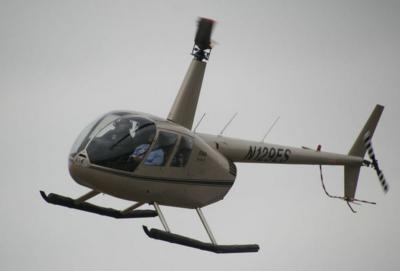Wed, Feb 25, 2015
Aircraft Grounded In Australia After Fatal Accident In New Zealand
The FAA has issues a Special Airworthiness Information Bulletin (SAIB SW-15-08) directed towards owners and operators of Robinson Helicopter Company model R44 and R44 II helicopters which have installed main rotor blades with part number C016-7 of a fatigue crack occurrence, and suggests a preflight check for signs of a fatigue crack on the trailing edge of the blade.

The FAA has received a report from New Zealand of an in-flight failure of the main rotor blade on a Robinson R44 II helicopter which resulted in severe main rotor vibration. The aircraft was difficult to control during the subsequent emergency landing. The New Zealand CAA released Continuing Airworthiness Notice – 62-003 on January 26, 2015 recommending a pre-flight inspection of this area. Robinson Helicopter Company subsequently released R44 Safety Alert C016-7 Main Rotor Blade Crack on February 23, 2015 recommending a preflight visual inspection of the trailing edge of the main rotor blade for any evidence of a fatigue crack initiation.
Australia's Civil Aviation Safety Authority (CASA) issued an emergency airworthiness directive grounding certain Robinson R44 helicopters operating in that country following the New Zealand accident.
The FAA says that at this time, the airworthiness concern is not an unsafe condition that would warrant airworthiness directive (AD) action under Title 14 of the Code of Federal Regulations (14 CFR) part 39.
The FAA says that as part of the daily preflight inspection, the trailing edge of the main rotor blade on the upper and lower surfaces of the blade (a stepladder may be necessary) should be visually checked for any damage which may initiate a fatigue crack. Check in the area shown on the Robinson Safety Alert C016-7 Main Rotor Blade Crack, dated February 23, 2015. If any damage is detected, the blade should be thoroughly examined by a qualified technician prior to further flight. If unusual rotor system vibration is detected in flight, land immediately and have blades examined by a qualified technician.
It is recommended that any positive findings be reported to the Robinson Helicopter Company.
(Image from file)
More News
Also: Netherlands Donates 18 F16s, 2 737s Collide On Ramp, E-7 Wedgetail Cut, AgEagle's 100th In S Korea The Pilot and Aircraft Privacy Act was introduced in the House by Represent>[...]
Pilot Also Reported That Due To A Fuel Leak, The Auxiliary Fuel Tanks Were Not Used On June 4, 2025, at 13:41 eastern daylight time, a Piper PA-23, N2109P, was substantially damage>[...]
Have A Story That NEEDS To Be Featured On Aero-News? Here’s How To Submit A Story To Our Team Some of the greatest new stories ANN has ever covered have been submitted by our>[...]
From 2023 (YouTube Edition): Reflections on War’s Collective Lessons and Cyclical Nature The exigencies of war ought be colorblind. Inane social-constructs the likes of racis>[...]
What Goes Around, May Yet Come Back Around, Klyde FMI: www.klydemorris.com>[...]
 Airborne 06.30.25: US v ADS-B Misuse, Natl STOL Fire, Volocopter Resumes
Airborne 06.30.25: US v ADS-B Misuse, Natl STOL Fire, Volocopter Resumes NTSB Prelim: Piper PA-23
NTSB Prelim: Piper PA-23 ANN FAQ: Submit a News Story!
ANN FAQ: Submit a News Story! Classic Aero-TV: One Mans Vietnam
Classic Aero-TV: One Mans Vietnam Klyde Morris (06.30.25)
Klyde Morris (06.30.25)



